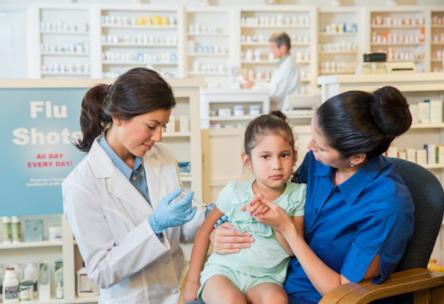More than just a place to fill prescriptions, today’s pharmacies can save you a trip to the doctor’s office

Chances are you’ve seen signs at your local pharmacy letting you know that you can get your annual flu shot while you’re picking up pain relievers and shampoo. Maybe you’ve even settled into a blood pressure kiosk to check your numbers while your prescription is being filled.
What you may not know, however, is that many pharmacies are now set up to offer a host of other preventive health care services too—everything from traveler’s vaccines to wellness events.
“People are beginning to realize that their local pharmacist is trained to meet many health care needs, which can save a trip to the doctor, freeing up their office times as well,” says Mohamed A. Jalloh, Pharm.D., assistant professor at Touro University California College of Pharmacy and spokesperson for the American Pharmacists Association. “Our goal in adding these services is to make the patient’s life better.”
Here’s a snapshot of some of the top services being offered at pharmacies. Laws vary by state, so check with your local pharmacist to find out what’s allowed where you live. Remember to also check your insurance plan to make sure it covers the cost of services handled at your pharmacy.
Vaccines. Flu shots got the trend started in the early 2000s, says Jalloh, and they are now commonplace. Also widely available are the recommended vaccines for people traveling overseas.
Nicotine replacement therapy. Some pharmacies offer smoking cessation education materials, and pharmacists can be trained as certified tobacco treatment specialists, which means they can counsel people who are trying to stop smoking. “A pharmacist is trained to recommend the best nicotine-replacement products for individuals, especially if it’s a pharmacist who knows your history,” says Jalloh. For example, certain products are better than others for those with allergies or skin sensitivities.
Wellness events. One or more times a year, many pharmacies invite outside health experts and related partners to in-store health care events. Here, customers can learn about disease prevention and management, get their blood pressure checked, and find out their cholesterol and blood glucose levels.
Contraception. Contraception is considered preventive care and does not require a diagnosis, explains Jalloh, so certain states, including Oregon, Colorado, New Mexico, and California, allow pharmacists to dispense these drugs without a doctor’s prescription. Women may be required to fill out a health questionnaire. (Maryland will join the list in 2018, and Washington, Missouri, Hawaii, South Carolina, New Jersey, and Tennessee are in line to follow.) Other states only allow pharmacists to dispense these drugs under the guidance of a physician.
Naloxone (or Narcan). With the rise of opioid addiction, state legislatures have made it easier for pharmacists to provide naloxone, or Narcan, without a prescription. The medication reverses an opioid overdose.


